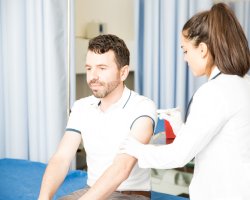Suboxone:
A Doubtful Path Out of Addiction

As the heroin and painkiller abuse epidemic has spread across America, it’s been followed by a concerted effort to increase availability of treatment for those who are addicted. Most of these efforts have focused on increasing access to Medication-Assisted Treatment (MAT). What does that mean? Generally, it means increasing the number of medical doctors who are allowed to give their patients an addictive drug named Suboxone.
What is Suboxone? It’s a formula designed for addiction treatment that contains buprenorphine, a synthetic opiate chemically similar to methadone, oxycodone or hydrocodone.
Suboxone also contains naloxone, a drug intended to prevent patients from being able to get high on the opioid. By giving a patient Suboxone, the patient has a replacement opioid for the drug he was abusing and he does not go into withdrawal.
The formula does not quite create the same euphoric high of heroin or potent painkillers. However, the formula has similar side effects to oxycodone or heroin, such as nausea, vomiting, headache, numbness, constipation and trouble concentrating.
Every Month, More Doctors Sign Up to Prescribe Suboxone
For the last couple of years, federal and private organizations have thrown their support exclusively behind the use of MAT, specifically Suboxone. Doctors in practice can be certified to administer Suboxone after completing an eight-hour online training program.

By early 2017, more than 37,000 doctors had qualified to prescribe buprenorphine to those addicted to painkillers or heroin. About two-thirds of these doctors are allowed to treat 30 patients at a time. Approximately a quarter can treat 100 patients and 8% of this group have been upgraded to treating 275 patients at a time.
How Does Someone Become Qualified to Dispense Suboxone?
By simply doing an 8-hour course any physician can become “qualified” to prescribe Suboxone. However, the average doctor only receives minimal education on addiction or recovery while in medical school. According to one report, emergency physicians and OB/GYNs only averaged three hours of addiction training in school. And according to one survey, only one-third of all doctors in practice felt their medical training adequately prepared them to address problems related to addiction.
In other words, these are not experts in addiction or recovery.
They could have been internists, gynecologists, pediatricians or general practitioners before signing up to prescribe Suboxone. The practices that offer Suboxone to patients are, in most cases, simply ordinary doctors’ offices. Whether the doctor felt prepared to address addiction or not, he could be certified to prescribe buprenorphine products to those wishing to leave addiction behind.
On this brief training, they take the futures of our loved ones is into their hands. Here are some questions you might want to ask:
- Will they know how to identify a person who is about to drop out of the program and relapse into heroin use?
- Will they be capable of providing counseling, drug testing and an effective exit strategy once the patient is ready to resume a normal, drug-free life?
- Will they be as focused on helping each patient truly recover from addiction or will they only be concerned with handing out the month’s prescription?
- And will these doctors help each person wean off this addictive formula as soon as possible so they can finally become 100% drug-free?
With just a total of eleven hours of training on addiction and recovery, few of these doctors will truly be qualified to help an addicted person recover complete sobriety.
In Contrast, A Holistic Recovery Program
The Narconon drug rehab program is holistic which means it addresses the whole person and the reasons he (or she) began to use drugs. There is even a special step of the program that puts a person much more in control of his cravings. A multi-step life skills training component then follows to help prevent relapse.

There are no drugs used in any phase of this recovery program. Here, the focus is only on true rehabilitation—restoring an individual’s ability to live a sober, productive life once again. Whether you’ve been through Suboxone treatment before or this is the first time you’re looking for recovery from addiction, learn about the Narconon program’s 50-year history of bringing sobriety to tens of thousands of individuals.
Read a first-hand account of what it’s like to try to recover from addiction using Suboxone from one of our graduates. And then call Narconon at 1-877-332-6981. You can have a truly drug-free future.
Sources:
http://drugabuse.com/library/the-effects-of-suboxone-use/
https://www.samhsa.gov/newsroom/press-announcements/201609271100
https://www.samhsa.gov/programs-campaigns/medication-assisted-treatment/physician-program-data


 ®
®